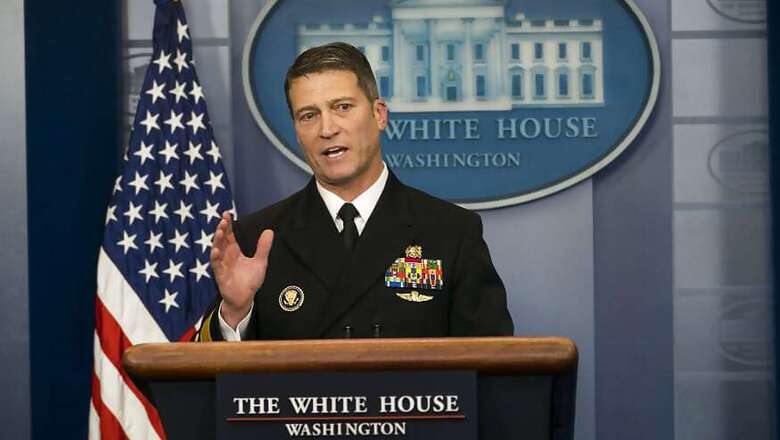
views
Wichita Falls (Texas): Dressed in cowboy boots and jeans, with an American flag pin on his lapel, Dr. Ronny L. Jackson rolled up at the Red River Harley-Davidson outpost to make his pitch to voters.
“I just came from the White House,” Jackson, the former White House physician, told the small crowd gathered upstairs from the Harley showroom. “I’ve been working side by side with the president. I know all the Cabinet secretaries. I have their cellphones. I know the chief of staff, the national security adviser. I can pick the phone up and I can call them. They’re all friends of mine.”
Jackson left the West Wing in December after rising from President Donald Trump’s physician to his unlikely pick to lead the Department of Veterans Affairs to Trump administration roadkill when he was forced to withdraw his name from consideration amid allegations related to his professional conduct.
Now he’s running for Congress in Texas’ 13th District, one of the most conservative in the country, and his argument is simple. In a primary field of 15 anti-immigrant, anti-abortion Republicans, Jackson is betting his personal connection with the president is enough to win the Republican nomination tantamount to election.
Standing alongside other candidates wearing cowboy hats and “Make America Great Again” caps at the forum Thursday, Jackson pitched himself as the only one “who can walk in the Oval Office unannounced and say, ‘Sir, I need you to stop what you’re doing and listen to me,’ and he will stop what he’s doing and listen to me.”
That access, he said, would make him an unusually powerful replacement for Rep. Mac Thornberry, the Republican who announced last fall he would not seek re-election after representing his district for more than a quarter of a century.
But it is not clear if that connection, combined with his background as a Navy rear admiral, will be enough to help Jackson overcome some rookie mistakes as a candidate. There have been more than a few.
His campaign organization, for one thing.
Jackson’s campaign manager, he said, is “a horse doctor” with a full-time job. He has one full-time staff member, a recent college graduate who is also working for free, and he has relied on his wife, Jane, to drive him around the enormous Panhandle-encompassing district, which spans 41 counties. And despite having a power Rolodex, he has never reached into it to ask the right people for help.
On Friday, Jackson spent the afternoon knocking on doors in Wichita Falls, only to realize that it was a relatively futile exercise since most people weren’t home. In the evening, he mingled in the bleachers at the Monarch Motor Speedway only to report back to his wife that most spectators had driven in from Oklahoma.
While waiting for the stock car race to begin, Jackson laughed when a hunk of mud spun up from the dirt track and landed in his coffee cup, a fitting way to end another long day on the campaign trail where it wasn’t clear if he’d made any progress.
Jackson, who grew up in Levelland, Texas, returned to the Panhandle after leaving the White House and retiring from the Navy, settling in the district in Amarillo. He thought his connections to Trump and the extended Trumpworld would make him a shoo-in for the seat, people who spoke to him at the time said.
But Trump, who now generally adheres to rules put in place by his political shop about whom he endorses and what races he weighs in on, has been silent about Jackson’s campaign. Donald Trump Jr., whom Jackson considers a close friend, has no plans to get involved in his race or officially endorse him, an aide said. And even Rick Perry, the former energy secretary and Texas governor who encouraged him to run and then endorsed him, has not campaigned for him.
Jackson is now facing an uphill battle against two well-funded and connected opponents — Chris Ekstrom, a Dallas millionaire who recently moved to the district to run and is self-funding his campaign, and Josh Winegarner, a lobbyist who has the backing of the cattle industry he represents and Thornberry.
But Jackson’s connections to the Trump administration as well as the president and his family are real, even if they have not translated into much support.
Eric Trump has tweeted a supportive message, and Trump has privately encouraged Jackson to run. And Jackson is benefiting, if belatedly, from Trump allies and aides who have only recently realized he needed help and have pitched in, setting him up with a real online fundraising and phone prospecting operation, which helped to finally get him on air with a commercial — a 30-second spot made up entirely of old clips of Trump praising his character.
At the candidates forum, Jackson, 52, conceded that he had “never really considered running for office.” But, he said, “Trump is getting re-elected. That’s a done deal at this point.”
“I thought this is the unique opportunity for me to get in the game,” he added. “I have an opportunity to get in the fight and do something for our country.”
Jackson, who served in the White House medical unit under the past three presidents, grew close to Trump after delivering the results of a presidential physical in a briefing at which he promoted Trump’s “incredible genes,” said he did “exceedingly well” on a cognitive test and claimed that if he had adhered to a better diet over the past 20 years, he could have lived to be 200.
His hour-long news conference transformed Jackson into an inner-circle Trump favorite, and a candidate, in Trump’s mind, for a Cabinet post. It also changed how he was perceived outside the building.
“That was the day I got the Trump stamp on me completely,” Jackson said during an interview last week at a coffee shop in Wichita Falls. “I was no longer viewed as a nonpartisan physician on military orders, even though I still technically was. What I didn’t realize was that it made people much more aggressive toward me when the VA nomination came up.”
At the time of the allegations against him — which included loosely dispensing strong drugs to lawmakers and political aides — Jackson was not allowed to respond because he was an active-duty military officer.
The experience took a toll on Jackson and his family.
“I tell people now that I got Kavanaugh-ed before Kavanaugh did,” he said, referring to Justice Brett Kavanaugh, who he believes was falsely accused of sexual assault during his Supreme Court confirmation hearings. “I was the pregame but I didn’t know it. I was the warm-up.”
Jackson called the allegations against him “complete garbage” and hinted at behind-the-scenes plotting from both parties to remove a Trump loyalist from contention.
“I saw the ugly side of Washington,” he said. He noted that despite the scandal, “I got promoted in the White House, I maintained my clearance, I stayed in the military, I retired as a Navy admiral. Come on.”
Trump mounted an aggressive defense of Jackson, even as a bipartisan group of Senators expressed concerns over his record. The president called for Sen. Jon Tester, D-Mont., to resign for his lead role in releasing details of the allegations against Jackson.
Trump called Jackson “one of the finest people that I have met” while elevating him to the role of assistant to the president. And in the 13th District, those words may be more important than any accusation.
“I’m leaning toward Ronny because I have to look at who’s electable,” said Danny Breegle, a business owner in Wichita Falls who attended the Thursday night forum. He said he was impressed with his résumé and “wanted to make sure he’s not of the swamp, and now I think he’s independent.”
But for Jackson, the question will be whether the last-ditch help from Trumpworld has come too late — by Friday, more than half of the vote will already be in because of early voting in the March 3 primary.
In the interview, Jackson admitted that he had not been aggressive in calling in favors, especially from the president. “He had so much on his plate. He was going through impeachment,” Jackson said. “I thought, I’m not going to put ‘Ronny Jackson in the 13th Congressional District’ on his plate.”
If he wins the seat, Jackson will be back on a government salary. If he loses, he said, he plans to make enough money to buy his wife any house in Amarillo she wants.
That is, if he doesn’t go back into the Trump administration. Jackson appeared to leave himself open to the possibility, but said his wife was committed to staying in Texas.
For now, Jackson said, he has put a Cabinet post in his rearview mirror, calling the Veterans Affairs Department a “massive bureaucracy” and asserting that “my ability to impact things will actually be better if I’m a congressman, even for the veterans.”
One of his regrets was moving on from his post as White House physician before he could help institute the diet and exercise regimen he had planned for the president.
During his infamous news conference, Jackson said his goal was to help Trump lose 10 to 15 pounds and that he planned to bring an exercise bike or elliptical machine into the White House residence.
Jackson said those plans never came to pass. (Trump had gained 4 pounds by his following physical.) “The exercise stuff never took off as much as I wanted it to,” he said. “But we were working on his diet. We were making the ice cream less accessible, we were putting cauliflower into the mashed potatoes.”
Annie Karni c.2020 The New York Times Company




















Comments
0 comment